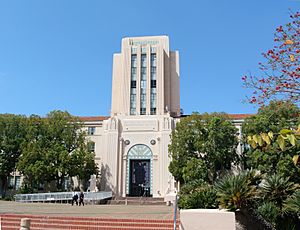Government of San Diego County, California facts for kids
The Government of San Diego County helps run things for everyone living in San Diego County, California. It follows rules from the California Constitution and other state laws. This government provides many important services across the county. These include things like holding elections, keeping public records, collecting taxes, and offering health and social services. For areas not part of a city (called "unincorporated areas"), the county government acts as their local government.
The county government has five elected leaders called the Board of Supervisors. There are also other elected officials like the Sheriff, the District Attorney, and the Assessor/Recorder/County Clerk. Many different departments work under a Chief Administrative Officer to help run the county.
Some cities, like San Diego and Chula Vista, have their own police, libraries, and parks. Other cities might pay the county to provide some of these services for them. Also, state courts like the San Diego Superior Court work within the county.
The county's motto is "The noblest motive is the public good." The main government offices are in the historic County Administration Center building. This building was built between 1935 and 1938.
Contents
How the County Government Works
Board of Supervisors
The San Diego County Board of Supervisors is like the county's main law-making group. It has five members, and people vote for them. This board does three main things:
- Makes Laws: They can create rules for the unincorporated areas of the county. They also help make rules that affect the whole county, like restaurant health ratings.
- Manages Departments: They guide what the different county departments do.
- Hears Appeals: If someone disagrees with a local planning decision, the Board is the final place to appeal.
In 2012, voters decided to put limits on how many terms supervisors can serve. This means supervisors can only serve two more terms after the rule started.
Elected Officials
Besides the Board of Supervisors, several other important officials are elected by the people of San Diego County. Their jobs are set by California's laws.
The San Diego County Sheriff's Department provides police services for areas not in a city. They also work for cities that pay them to be their police force. The Sheriff's Department is also in charge of the county jails and keeping courthouses safe. They handle special services like search and rescue.
The San Diego County District Attorney is a lawyer who brings legal cases against people accused of crimes in San Diego County.
The San Diego County Assessor/Recorder/County Clerk has three main jobs:
- Assessor: They figure out the value of properties for tax purposes.
- Recorder: They keep important legal papers, like birth, marriage, and death records.
- County Clerk: They issue marriage licenses and register businesses.
The San Diego County Board of Education has five members elected by the community. They set the rules for the San Diego County Office of Education (SDCOE) and choose the county's Superintendent of Schools.
Other Important County Groups
The Chief Administrative Officer helps the Board of Supervisors manage the county's daily operations. They also suggest ideas to the Board.
The San Diego County Library is the public library system for the county.
The Probation Department works with people who have been found guilty of crimes. They help supervise these individuals in the community.
The Health and Human Services Agency (HHSA) offers health and social support. This includes programs like Medi-Cal (health insurance) and CalFresh (food assistance).
The Department of Housing and Community Development (HCD) helps provide public housing through the Housing Authority of the County of San Diego.
The Department of Public Works takes care of county roads, manages traffic, and oversees building projects. They also work on flood protection, county airports, and waste management.
The County Parks and Recreation Department manages many parks, campgrounds, and trails. They also run recreation centers and protect natural areas.
The San Diego County Office of Education (SDCOE) is the county's education department. It works under the San Diego County Board of Education and is led by the San Diego County Superintendent of Schools.
The San Diego County Public Defender provides legal help to people who cannot afford a lawyer.
Other Governments in San Diego County
The San Diego Association of Governments (SANDAG) is a group of local governments in San Diego County that work together on regional issues.
California State Government
The state government also has a presence in San Diego County. For example, the San Diego Superior Court is part of California's court system. While the county used to own the courthouses, the state now owns them. However, the county still helps provide security for these courts.
City of San Diego Government
The city of San Diego has its own government, led by a mayor and a nine-member city council. The mayor is like the city's chief executive, and the council makes the city's laws. Both the mayor and council members are elected for four-year terms.
School Districts
There are many different school districts throughout San Diego County. Each district manages its own schools.
Special Districts
Special districts are local government groups that provide specific services. For example:
- The San Diego Metropolitan Transit System (MTS) provides public transportation in many parts of the county.
- The North County Transit District (NCTD) provides public transportation in North San Diego County.
- Health districts like the Beach Cities Health District help with public health services.
- The Port of San Diego manages the areas around San Diego Bay.
Political Parties
In California, political parties can form local groups called central committees in each county. These groups help organize elections and support candidates for office. For example, there's the San Diego County Democratic Party Central Committee and the Republican Party of San Diego County Central Committee. Members of these committees are elected by voters during primary elections.
 | Selma Burke |
 | Pauline Powell Burns |
 | Frederick J. Brown |
 | Robert Blackburn |


